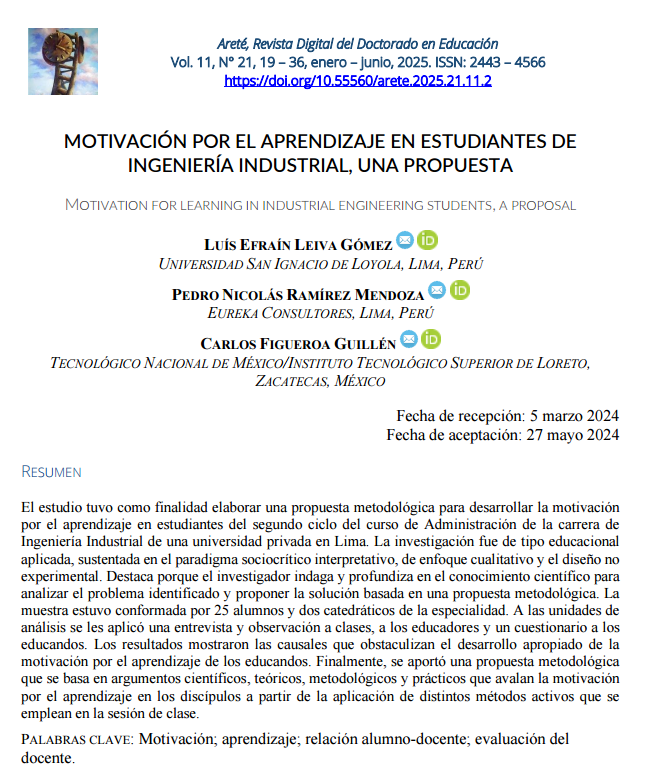Motivation for learning in industrial engineering students, a proposal
Keywords:
Motivation, learning, student-teacher relationship, teacher evaluationAbstract
The purpose of the study was to develop a methodological proposal to develop motivation for learning in students of the second cycle of the Administration course of the Industrial Engineering career at a private university in Lima. The research was of an applied educational type, based on the interpretive socio-critical paradigm, qualitative approach and non-experimental design. It stands out because the researcher investigates and delves into scientific knowledge to analyze the identified problem and propose the solution based on a methodological proposal. The sample was made up of 25 students and two professors of the specialty. To the units of analysis, an interview and observation of classes were applied to the educators and a questionnaire to the students. The results showed the causes that hinder the appropriate development of students' motivation for learning. Finally, a methodological proposal was provided that is based on scientific, theoretical, methodological and practical arguments that support the motivation for learning in the disciples from the application of different active methods that are used in the class session.
Downloads
References
Álvarez de Zayas, C. (2015). Psicología del Aprendizaje. Kipus.
Addine, F. (2015). La didáctica general y su enseñanza en la Educación Superior. Pueblo y Educación
Barca, A., Oca, G., & Moreta, Y. (2019). Motivación, enfoques de aprendizaje y rendimiento académico: Impacto de metas académicas y atribuciones causales en estudiantes universitarios de educación de la República Dominicana. Revista Caribeña de Investigación Educativa (RECIE), 3(1), 19-48.
Carralero, L. (2017). El Clima psicológico en el proceso de enseñanza-aprendizaje del Seminternado Rudiberto Cuadrado. (Tesis de Licenciatura, Universidad de Holguín). http://repositorio.uho.edu.cu/jspui/handle/uho/4614
Cisterna, F. (2007). Manual de metodología de la investigación cualitativa para educación y ciencias sociales. FC Cabrera, https://n9.cl/ir0nb
Díaz, B. & Hernández (2010). Estrategia Docente para un aprendizaje significativo. Mc. Graw Hill.
Escobar-Pérez, J., & Cuervo-Martínez, Á. (2008). Validez de contenido y juicio de expertos: una aproximación a su utilización. Avances en medición, 6(1), 27-36.
Fasce, E., Ortiz, L., Torres, G., Delgado, M, Ortega, J. & Moraga, A. (2018). Intervención para el aprendizaje en clases didácticas prolongadas de asignaturas clínicas. Educación Médica Superior, 32(1), 48-62. https://n9.cl/zfarj
González, V. (2003). Estrategias de enseñanza y aprendizaje. Pax.
González, D. (2008). Teoría de la motivación y práctica profesional. Pueblo y Educación.
Hernández, R., Fernández, C. & Baptista, P. (2016). Metodología de la Investigación. McGraw–Hill.
Llanga, E., Silva, M., & Vistin, J. (2019). Motivación extrínseca e intrínseca en el estudiante. Atlante: Cuadernos de Educación y Desarrollo. https://www.eumed.net/rev/atlante/2019/09/motivacion-extrinseca-intrinseca.html
Martínez, H. & Ávila, E. (2011) Metodología de la Investigación. Cengage Learning
Naranjo, M. (2009). Motivación: perspectivas teóricas y algunas consideraciones de su importancia en el ámbito educativo. Revista Educación, 33(2): 153-170.
Mora, F. (2017). Neuroeducación: solo se puede aprender aquello que se ama. Alianza.
Ortiz, A. (2015). Neuroeducación ¿Como aprende el cerebro humano y como deberían enseñar los docentes? Ediciones de la U.
Pekrun, R. (1992). The impact of emotions on learning and achievement: Towards a theory of cognitive/motivational mediators. Applied Psychology, 41(4), 359-376.
Pérez, R., & Malagón, M. (2011). La didáctica y el método de ascenso de lo abstracto a lo concreto. Pedagogía Universitaria, 16(4), 1-25.
Pintrich, P. (1994). Student motivation in the college classroom. Handbook of college teaching: Theory and applications, 23-43.
Rodríguez, A., & Pérez, A. (2017). Métodos científicos de indagación y de construcción del conocimiento. Revista Ean, (82), 179-200.
Tobón, S. (2013). Estrategias didácticas para la formación de competencias. AB Representaciones
Torres-Quiroga, S. (2016). Factores que inciden en la motivación de los estudiantes para continuar estudiando Comunicación Social–Periodismo. Praxis, 12(1), 8-20.
Tous, C., & Amorós, M. (2007). Motivaciones para el estudio en universitarios. Anales de Psicología, 23(1), 17-24.
Utkin, L. (2006). A method for processing the unreliable expert judgments about parameters of probability distributions. European Journal of Operational Research, 175(1), 385-398.
Valle, A. (2007). Algunos modelos importantes en la investigación pedagógica. Instituto Central de Ciencias Pedagógicas.
Velázquez, M. (2014). Propuesta metodológica dirigida a la competencia comunicativa en la construcción de textos escritos es los estudiantes de sexto grado en la educación primaria (Tesis Doctoral). Pontificia Universidad Católica Americana.
Vygotski, L. (1996). El desarrollo de los procesos psicológicos superiores. Crítica.

Published
How to Cite
Issue
Section
License
Copyright (c) 2024 Luis Efraín Leiva Gómez, Pedro Ramírez Mendoza, Carlos Figueroa Guillén

This work is licensed under a Creative Commons Attribution-NonCommercial-ShareAlike 4.0 International License.
This journal provides free, immediate access to its content under the principle of making research freely available to the public, which fosters a greater exchange of global knowledge.
Authors who publish in Areté, Revista Digital del Doctorado en Educación, agree to the following terms:
- Authors retain copyright and grant the journal the right to be the first publication of the work, as well as licensed under a Creative Commons Attribution License that allows others to share the work with an acknowledgement of authorship of the work and initial publication in this journal.
- Authors may separately establish additional agreements for the non-exclusive distribution of the version of the work published in the journal (for example, placing it in an institutional repository or publishing it in a book), with an acknowledgement of its initial publication in this journal and not to be used for commercial purposes.
- The contents and images included in the articles are the responsibility of the author(s). Areté, Revista Digital del Doctorado en Educación, is not responsible for the information included in them.
- Authors agree with the license of use used by the journal, with the self-archiving conditions and with the open access policy.
- Authors are allowed to disseminate electronically (e.g., in institutional repositories or on their own website) the published version of their work, as it favors its earlier circulation and dissemination and thus a possible increase in its citation and reach among the academic community.
- In case of reuse of published works, the existence and specifications of the license of use must be mentioned, as well as the authorship and original source of publication.






